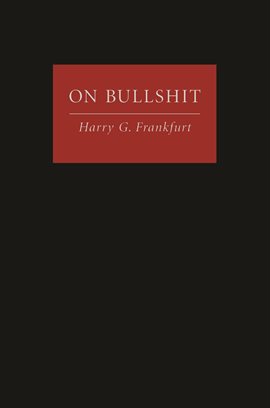
eBook
hoopla Instant
On Bullshit
Year
2009
Language
ENGLISH
Publication Information
Princeton University Press
Summary
"A #1 New York Times Bestseller" "Harry G. Frankfurt, Charles Homer Haskins Prize Lecturer, American Council of Learned Societies" "Winner of the Bestseller Award in Philosophy, The Book Standard" Harry G. Frankfurt (1929–2023) was professor of philosophy emeritus at Princeton University. His books include On Inequality, The Reasons of Love, and Demons, Dreamers, and Madmen (all Princeton). The #1 New York Times bestseller that explains why bullshit is far more dangerous than lying One of the most salient features of our culture is that there is so much bullshit. Everyone knows this. Each of us contributes his share. But we tend to take the situation for granted. Most people are rather confident of their ability to recognize bullshit and to avoid being taken in by it. So the phenomenon has not aroused much deliberate concern. We have no clear understanding of what bullshit is, why there is so much of it, or what functions it serves. And we lack a conscientiously developed appreciation of what it means to us. In other words, as Harry Frankfurt writes, "we have no theory." Frankfurt, one of the world's most influential moral philosophers, attempts to build such a theory here. With his characteristic combination of philosophical acuity, psychological insight, and wry humor, Frankfurt proceeds by exploring how bullshit and the related concept of humbug are distinct from lying. He argues that bullshitters misrepresent themselves to their audience not as liars do, that is, by deliberately making false claims about what is true. In fact, bullshit need not be untrue at all. Rather, bullshitters seek to convey a certain impression of themselves without being concerned about whether anything at all is true. They quietly change the rules governing their end of the conversation so that claims about truth and falsity are irrelevant. Frankfurt concludes that although bullshit can take many innocent forms, excessive indulgence in it can eventually undermine the practitioner's capacity to tell the truth in a way that lying does not. Liars at least acknowledge that it matters what is true. By virtue of this, Frankfurt writes, bullshit is a greater enemy of the truth than lies are. "Spare yourself the annual round-ups in the newspapers or the boy-scout enthusiasm of podcasters. To understand the great political shift of this year, the work you need is a piece of philosophy called-what else?-On Bullshit."---Aditya Chakrabortty, The Guardian "Immediately, I must say: read it. Beautifully written, lucid, ironic and profound, it is a model of what philosophy can and should do. It is a small and highly provocative masterpiece, and I really don't think I am bullshitting you here."---Bryan Appleyard, Sunday Times "[Frankfurt] tries, with the help of Wittgenstein, Pound, St. Augustine and the spy novelist Eric Ambler, among others, to ask some of the preliminary questions-to define the nature of a thing recognized by all but understood by none. . . . What is bullshit, after all? Mr. Frankfurt points out it is neither fish nor fowl. Those who produce it certainly aren't honest, but neither are they liars, given that the liar and the honest man are linked in their common, if not identical, regard for the truth."---Peter Edidin, New York Times "A slim treatise on the pervasive, willful and devilish art of avoiding the truth." "Terrific. . . . Has anything truer ever been written?"---William Watson, Montreal Gazette "On Bullshit offers a tightly focused, telling critique of a political and cultural climate that seems positively humid with mendacity, obfuscation, evasion and illusion."---Steven Winn, San Francisco Chronicle "[Frankfurt] attracted public attention on a scale unimaginable to most academic philosophers. The reason for his appearances on Jon Stewart's Daily Show, CBS's 60 Minutes and other US network TV programmes was On Bullshit, his brief but bestselling disquisition on what he described as 'one of the most salient feat